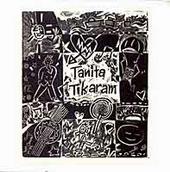Tanita Tikaram was born in Munster, Germany where her father, an Indian-Fijian British Army officer, was stationed with his Malaysian wife. It was Tanita's mother who gave her daughter that euphonious first name, for no other reason than its melodious sound.
Melody, along with harmony, lyrics and rhythm, were a central part of the Tikaram household from Tanita's childhood on. "My brother would do Elvis impersonations," she recalls, "and I would back him up on the harmonies. I loved the Beatles as well as soul and country music, with all those wonderful tragic tunes and straight-from-the-heart lyrics. I grew up listening to a whole range of women singers in the '70s, from Karen Carpenter and Linda Ronstadt to Rita Coolidge and Crystal Gayle."
The Tikaram family relocated to England when Tanita was twelve, settling in suburban Basingstoke. Her sense of isolation in her new environs drove her further into music and by the time she was sixteen, she was writing her own original songs. Characteristically, her lyrical and compositional influences were eclectic and wide-ranging, from Virginia Woolf and West Side Story to the confessional musings of Joni Mitchell and John Lennon.
Taking a year off before beginning her college studies, Tanita secured a day job selling advertising and used the proceeds to finance a demo tape. It was that tape that fell into the hands of agent and manager Paul Charles, who, after seeing Tanita perform at an open-mike night in a London club, immediately took her under his wing. Literally within weeks, she had landed opening spots supporting the likes of Paul Brady, Warren Zevon and Jonathan Richman. The next step was inevitable: a record company bidding war that ended when the young artist signed to WEA in the UK and Reprise for the U.S. By the summer of that year, 1988, she had released her first single, "Good Tradition," an immediate Top Ten hit. Tanita was eighteen years old.
The song was followed by her first album, Ancient Heart, produced by Peter Van Hooke and Rod Argent. It went on to sell four million copies worldwide and launched Tanita's career as a world class performer. Two more albums, The Sweet Keeper (1990) and Everybody's Angel (1991), consolidated her reputation as a singer and songwriter of rare range and resonance.
The 1992 release of Eleven Kinds Of Loneliness -- its title taken from a classic collection of short stories by American author Richard Yates -- was Tanita's first solo production and served as an homage to still more of her favorite artists, including Nina Simone, Phil Spector, the Beatles and Ry Cooder.
After so prolonged a period of creative activity, Tanita took a well-deserved sabbatical over the next two years, but typically for this prolific artist, she used the time to further refine her songwriting skills. And when not putting her own words to her own music, she found herself increasingly in demand as a collaborator, contributing tracks to the Bronte Brothers' album, The Way Through The Woods, and teaming with Christie Hennessy for his album, Lord of Your Eyes. She was commissioned by the BBC to set music to the poetry of Stevie Smith and contributed to the annual Abitare III Tempo exhibition in Italy.
With so busy a schedule, she naturally limited her live appearances to a choice few, including a Nanci Griffiths appearance at the Royal Albert Hall. It was also a period of extensive travel for Tanita, including sojourns in China, France, Romania, Italy and San Francisco. Eventually, she settled in Los Angeles, to begin work on what would become her fifth album, Lovers In The City, co-produced by Thomas Newman, a film composer with credits that include Scent Of A Woman and Fried Green Tomatoes.
Following a three year sabbatical during which she acted and travelled, in 1998 Tanita came up with an atmospheric new album, The Cappuccino Songs.
In 2005 Tanita Tikaram returned with a new collection, entitled Sentimental.
Sentimental is Tanita’s sixth studio album and her first record since 1998’s, Cappuccino Songs. The album features 10 new songs and a unique vocal collaboration with Nick Lowe who sings on two of the tracks.
